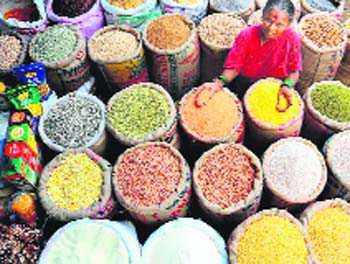
Vibha Sharma
Tribune News Service
New Delhi, July 3
With retail prices of three pulses — arhar, moong and urad — breeching the Rs 100-a-kg mark, the Centre has decided to ask states to continue with stock limit on these to curb their hoarding.
Currently there is a blanket stock limit on all varieties of pulses, including chana, masur and matar, which the Centre plans to remove from the list.
A decision on this and other issues related to price rise, hoarding and implementation of the National Food Security Act will be taken at a meeting between the Centre and state ministers scheduled on July 7, said Food and Consumer Affairs Minister Ram Vilas Paswan.
Paswan remained confidence that ill-effects of bad monsoon would not be felt on the public distribution system. He said the government would not allow prices of essential food items to increase due to the impact of possible deficient seasonal rain this year. The Centre is also contemplating a 10 per cent import duty on wheat to curb shipments and liquidate lustre-less grain acquired in the wake of unseasonal rains earlier this year.
Currently, there is no import duty on wheat. But reports suggest traders are importing wheat on account of lower global prices and availability of low-quality grains acquired domestically.
Contending that the government had only reduced standards so far as lustre was concerned, Paswan said no compromise had been made on the quality of the procured grains.
The duty will help offload excess stocks available domestically. Paswan said 270 lakh tonne was available in the stocks.
The government is considering a long-term solution to the perennial problem of the sugar industry, squeezed between high sugarcane prices mandated by the government and falling sugar prices due to excess availability.
Saying Prime Minister Narendra Modi wants a permanent solution to the problem, Paswan said while farmers could not be persuaded to grow less cane, the problem of excess sugar in a weak market could be taken care of by reducing production and making ethanol blending compulsory in fuel.



























